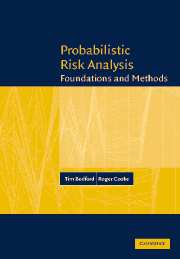Book contents
- Frontmatter
- Contents
- Illustrations
- Tables
- Preface
- Part I Introduction
- Part II Theoretical issues and background
- Part III System analysis and quantification
- Part IV Uncertainty modeling and risk measurement
- 13 Decision theory
- 14 Influence diagrams and belief nets
- 15 Project risk management
- 16 Probabilistic inversion techniques for uncertainty analysis
- 17 Uncertainty analysis
- 18 Risk measurement and regulation
- Bibliography
- Index
13 - Decision theory
from Part IV - Uncertainty modeling and risk measurement
Published online by Cambridge University Press: 05 June 2012
- Frontmatter
- Contents
- Illustrations
- Tables
- Preface
- Part I Introduction
- Part II Theoretical issues and background
- Part III System analysis and quantification
- Part IV Uncertainty modeling and risk measurement
- 13 Decision theory
- 14 Influence diagrams and belief nets
- 15 Project risk management
- 16 Probabilistic inversion techniques for uncertainty analysis
- 17 Uncertainty analysis
- 18 Risk measurement and regulation
- Bibliography
- Index
Summary
In this chapter we shall give a brief introduction to some of the important ideas in decision theory. Decision analysis is an important area of application for quantitative risk analysis. Although many risk analyses are performed simply to show that an installation conforms to the requirements of a regulator, quantitative risk analyses are increasingly being used as input to a decision making process. Logic seems to dictate that a quantitative risk analysis be followed by a quantitative decision analysis.
The field of decision analysis is far too rich to describe in a single chapter. We shall, then, deal quickly with the basic notions required to give simple examples of multi-attribute decision making under uncertainty for a single decision-maker. See [French, 1988] and [Keeney and Raiffa, 1993] for deeper discussions of all the issues involved.
Decision theory has been long split by heated discussions between protagonists of normative theories and those of descriptive theories. A descriptive theory tries to represent beliefs and preferences of individuals as they are. A normative theory tries to model how an individual's beliefs should be structured if they were to follow certain elementary consistency rules which might be expected of a rational individual.
More recently, these two groups moved towards each other. In particular, the adherents of the normative approach see their methods as being an aid to the decision-maker in achieving consistent (rational) preferences.
- Type
- Chapter
- Information
- Probabilistic Risk AnalysisFoundations and Methods, pp. 259 - 285Publisher: Cambridge University PressPrint publication year: 2001



